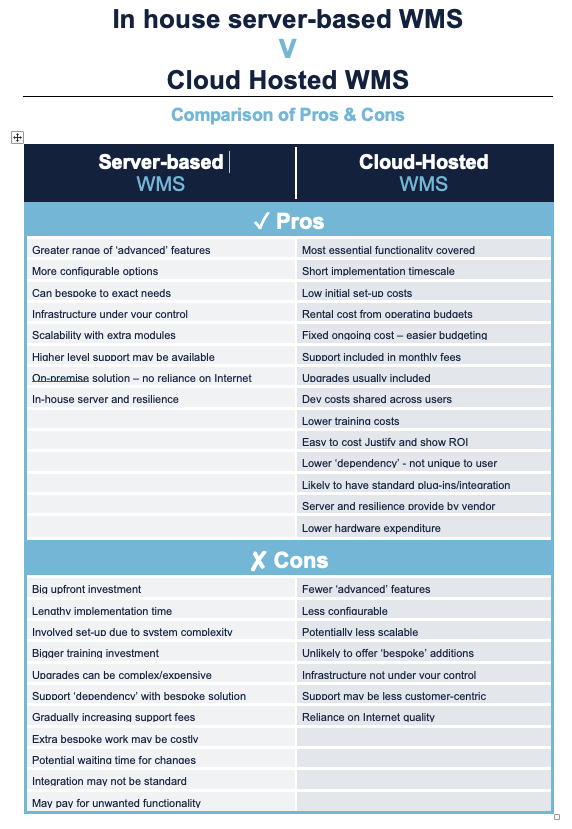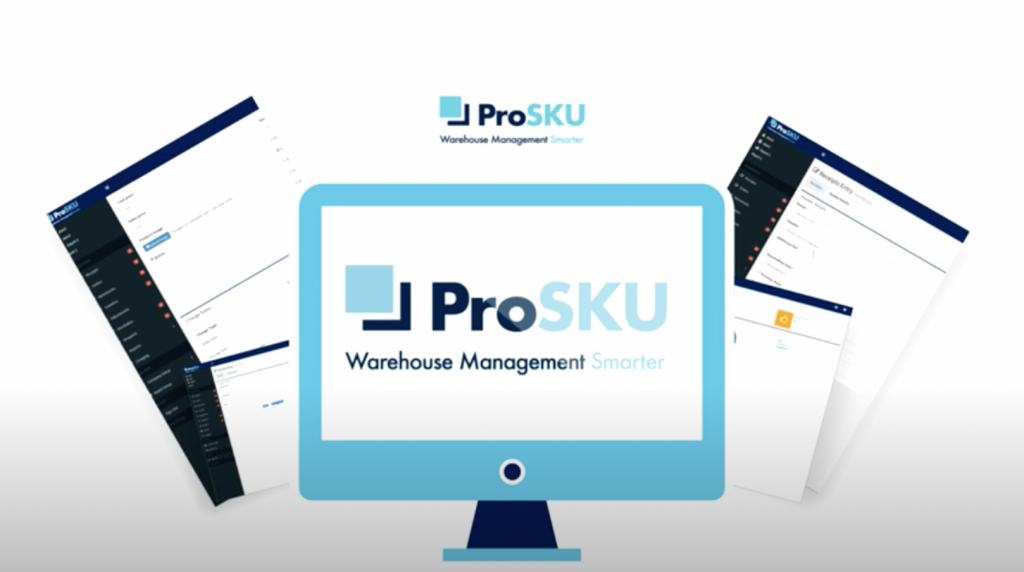Warehouse Management System Guide
See what ProSKU WMS Cloud can do for your business.
A Warehouse management system is a software system that helps support and optimise warehouse management functions and distribution centre management.
It helps handle all of the activities involved in managing an operation where goods are stored.
They promote better use of the warehouse space for businesses, more effective storage and improved control of movements.
A modern warehouse management system uses software that can manage palletised products or mixed pallets and loose items such as cartons or cases.
The software also provides businesses with highly efficient methods to manage many other warehouse management operations like the receipt, putaway and picking of goods, with attributes like automatic space allocation to increase storage efficiency.
The software accepts sales orders directly or via integration to external applications such as an ERP system, which it processes as picking instructions.
Standard software functionality includes features to control stock activities like internal transfers, adjustments and stocktaking.
A modern WMS normally provide extensive inventory reports and outputs on stored stock, orders processed and completed movements.
Increasing they are often based in the cloud as opposed to on business premises.

Why are they needed?
Warehouse management systems meet the fundamental needs of modern storage and distribution centres to maintain constant flow and management in supply chains.
The need to monitor inventory, to pick, receive and put away goods.
Whether you have a warehouse or just a modestly sized storage unit, the warehouse management activities that take place will almost certainly be similar, but perhaps on a different scale to those that happen in a large modern distribution centre.
But all storage facilities have similar requirements: the need to receive and record goods coming in with the data recorded varying by nature of the product.
Once received, goods must be stored somewhere, with ideally, their precise location recorded so that they can be found easily when required.
When goods are removed from storage, usually for a customer order, several processes may take place before physical despatch from the distribution centre.
Picking
The first stage is picking, the extraction of goods from a storage location.
After that, according to product and customer requirements, other activities may be involved before goods finally leave your premises.
Processing
These could include processing – modifying in some way – or consolidating with other goods, as well as checking, wrapping, packing and labelling.
So the process is simple in essence.
But in what appears to be simple there is still scope for mistakes to occur.
This can, and probably will happen if correct warehouse management procedures are not adopted at the outset, and maintained particularly through growth phases.
How successfully a warehouse is managed depends largely on the extent to which disciplined, structured practices are adhered to.
Where does a WMS fit in the Supply Chain?
Inventory management is fundamental to successful supply chain operations, and a warehouse management system plays a key part in reducing unnecessary business costs.
WMS capabilities may be used at various points in the supply chain, but to function efficiently and meet consumer demand each supply chain element needs to have real-time inventory visibility.
A WMS provides such capabilities, like a real-time view of the supply chain because its stock position is updated constantly to the software when each transaction is completed.
By integrating with supply chain applications like ERP systems, key intelligence can then be shared and used to advise stock availability, analyse future demand and forecast replenishment needs.
Sectors that use a Warehouse Management System
A WMS can be used in almost any sector or environment including the shipping, manufacturing and wholesale sectors, transportation and logistics, e-commerce and third-party fulfilment.
Its software is used for anything from bulk products like sand or grain to fine jewellery and secure documents.
The fundamental technology of a WMS remains the same regardless of sector or nature of goods i.e. to receive, store in a location, extract (pick) based on some form of instruction or order, and provide reporting functions.
However, the way in which things are done by WMS’ in one sector may be quite different from others.
WMS’ are always a key requirement for supply chain management, where integration with other applications and sharing such as manufacturing control or order management systems is essential for sharing data and visibility.
Types of Warehouse Management Systems
Systems for warehouse operations come in all types and are used in all types of business: from someone using hard copy documents in filing cabinets to the modern integrated, end to end, cloud-hosted system like ProSKU’s.
A software system may be developed for an organization in-house based on their specific requirements or it may be purchased from vendors like ProSKU.
While self-made, defined for your own business needs used to be a popular route, increasingly customisable and cloud-hosted solutions offer compelling alternatives to meet the complexity of modern supply chain management in the digital era.
The affordability of highly sophisticated systems that can boost productivity and reduce costs being key for many businesses today.
General Features of a Warehouse Management System
Depending on their cost and market sector WMS software properties can vary considerably.
Their primary service is to manage the warehouse operations of a business in real-time such as the receiving and putaway of goods, picking and shipping activities.
Many pick options may be available including various wave-picking methods like cluster picking and bulk picking.
Other warehouse operations are available to transfer and adjust stock and perform stocktake activities.
Most modern WMS systems now support real-time operations using handheld mobile computers connected to the cloud and equipped with barcode scanners. This enables organisations to get the most current critical data impacting their supply chain.
Larger enterprise-level systems will support advanced functions for labour management and yard management, and potentially include integrated modules for transportation management.
Benefits of a Warehouse Management System
A WMS provides many advantages for a business such as reducing unnecessary costs when used properly in the right environment, making a major contribution to improved business growth and business performance.
WMS processes enable the most efficient way to perform end to end warehouse activities, allowing warehouse resources to be optimised and overall operation to be streamlined.
Accuracy and efficiency are the key perks derived from disciplined adherence to WMS processes which foster improved productivity and result in better utilisation of resources.
A fully organised warehouse or distribution centre at the heart of your business will improve customer satisfaction, create faster growth and result in improved profit margins.
Cloud-based Warehouse Management System

Cloud-based WMS are warehouse management systems available over the internet in the cloud accessible via browsers and have some key advantages over server-based WMS.
Benefits of a Cloud-Based WMS
- Easy delivery – Cloud-based warehouse management systems do not require a dedicated on-premise server like self-managed, standalone systems and their software can be accessed via a PC or mobile device with internet access and an easy to use interface, providing real-time visibility on portable devices.
- Less costly – Cloud-based systems are usually multi-tenanted so the cost of use is shared with other users making them very cost-effective against on-premise systems which may need hardware and IT specialists.
- Rapid implementation – If based in the cloud, the technology is much quicker to implement, with lower upfront costs, and easier to support as their attributes are not unique to any one user.
- Customisable – Flexible – Cloud-based systems can be more responsive to changes in the market or disruption in supply chains whose complexity is increasing due to digital developments
- Upgrade – For similar reasons, performance upgrades that provide access to a wider range of functionality and technology than dedicated solutions are easier to do in the cloud, and usually covered by the subscription price.
ProSKU WMS
 Receiving Operations
Receiving Operations
ProSKU is a solution that can adapt to varied operational processes and the business requirements of myriad companies. We know that every operation differs for our customers to some degree, but we’re confident that its flexibly designed characteristics can meet your needs. If not we may be able to include attributes in future system releases that meet your requirements and those of other system users.
Stock Management
ProSKU aims to provide a solution flexible enough for any physical stock situation for our customers.
If the system doesn’t match all your needs exactly we are confident that it reflects the best management practice for customers, and offers tangible, practical advantages.
We are also committed to ongoing system upgrades and development with broad appeal to our user base.
Order Management
Whether you’re selling online, manufacturing or delivering fulfilment services, receipt of accurate order data on inventory is vital.
ProSKU can capture e-commerce orders from multiple sources for our customers including marketplaces, carts and multi-channel solutions.
But it can equally well integrate with an ERP system or SCM systems using open API or established file transfer protocols.
Pick & Despatch Management
Physical fulfilment of customer orders may be the final service stage in the process, but it can be a defining one. This is why efficient order picking by multiple processes is a hallmark of the ProSKU product. And with secure validation of despatch and key carrier integration, meeting your customer promise is made easy.
Mobile WMS App
The design of ProSKU ‘s mobile app reflects the extensive experience of the physical storage environment. We believe an adaptable, well-designed standard system saves our customers time and money compared with a bespoke or customised solution. And as ProSKU is constantly developing, everything we learn from our users helps to make it a better solution.
See what ProSKU WMS Cloud can do for your business and , BOOK YOUR DEMO TODAY
